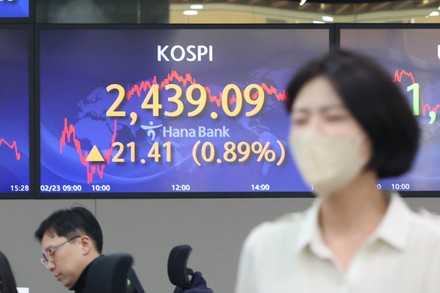OpenAI's ChatGPT Under FTC Scrutiny: Implications For The Future Of AI

Table of Contents
The FTC's Concerns Regarding ChatGPT and Potential Violations
The FTC, tasked with protecting consumers from unfair or deceptive business practices, has a vested interest in the responsible development and deployment of AI. Their mandate focuses on ensuring fair competition and preventing consumer harm. Regarding ChatGPT, the FTC's concerns likely center on several key areas:
- Potential for Unfair or Deceptive Practices: ChatGPT's ability to generate convincingly realistic text raises concerns about its potential use in scams, misinformation campaigns, and the creation of deepfakes. The FTC might investigate whether OpenAI adequately safeguards against such misuse.
- Data Privacy Violations and the Handling of User Data: The vast amounts of data used to train ChatGPT raise serious privacy concerns. The FTC will likely scrutinize OpenAI's data collection practices, user consent procedures, and the security measures employed to protect sensitive user information. This includes compliance with regulations like CCPA and GDPR.
- Algorithmic Bias and Discriminatory Outcomes: AI models like ChatGPT can inherit and amplify biases present in their training data, leading to discriminatory outcomes. The FTC might investigate whether ChatGPT exhibits biases related to gender, race, or other protected characteristics, violating fair lending or housing laws.
- Misinformation and the Spread of False Narratives: ChatGPT's capacity to generate convincing but false information poses a significant risk. The FTC might examine OpenAI's efforts to mitigate the potential for ChatGPT to be used to spread misinformation and propaganda. This includes exploring methods for detecting and flagging potentially harmful outputs.
These concerns are backed by existing regulations like the Federal Trade Commission Act, which prohibits unfair or deceptive acts or practices in commerce.
Implications for OpenAI and the Broader AI Industry
The FTC investigation into ChatGPT carries significant implications for OpenAI and the entire AI industry. Potential consequences for OpenAI could include:
- Substantial Fines: If the FTC finds OpenAI in violation of consumer protection laws, it could face hefty fines.
- Regulatory Changes: The investigation may lead to stricter regulations on the development and deployment of large language models (LLMs) like ChatGPT.
- Limitations on Future Development: The FTC might impose limitations on OpenAI's future research and development activities.
The ripple effect across the AI industry will likely involve:
- Increased Scrutiny: Other companies developing and deploying AI systems will face increased scrutiny from regulators.
- Stricter Regulations: The FTC's actions could set a precedent for more stringent regulations across the AI sector.
- Shift in Development Priorities: Companies may prioritize AI safety, ethics, and compliance with regulations over rapid development.
- A Chilling Effect on Innovation: The fear of regulatory penalties could stifle innovation in the AI field. Companies might be less inclined to pursue ambitious AI projects.
Companies like Google, Meta, and Microsoft, heavily invested in AI development, will need to adapt to this changing regulatory landscape.
The Future of AI Regulation in Light of the ChatGPT Investigation
The ChatGPT investigation underscores the urgent need for comprehensive AI regulation. Several approaches are being debated:
- Self-Regulation: The AI industry could establish its own ethical guidelines and standards. However, this approach lacks the enforcement mechanisms of government oversight.
- Government Oversight: Governments can create specific laws and regulations to govern AI development and deployment. This approach offers stronger enforcement but might stifle innovation if not carefully designed.
- International Cooperation: Given the global nature of AI, international cooperation is crucial to establish consistent and effective regulations.
Challenges in regulating AI include:
- Rapid Technological Advancements: AI technology evolves rapidly, making it difficult for regulations to keep pace.
- Cross-Border Data Flows: Data used to train AI models often flows across national borders, creating complexities in enforcement.
- Complexity of AI Algorithms: The "black box" nature of some AI algorithms makes it difficult to assess their potential risks and biases.
The EU's AI Act and similar legislative efforts in the US represent steps toward establishing a regulatory framework.
Ethical Considerations and Responsible AI Development
Ethical considerations must be central to AI development. This includes:
- Transparency and Explainability: AI systems should be designed to be transparent and explainable, allowing users to understand how they work and why they make certain decisions.
- Bias Mitigation and Fairness: Efforts should be made to mitigate bias and ensure fairness in AI algorithms.
- User Privacy and Data Security: The privacy and security of user data must be protected.
Responsible AI development requires a multi-faceted approach involving collaboration between researchers, developers, policymakers, and the public.
Conclusion: Navigating the Future of AI with Enhanced Oversight – The ChatGPT Precedent
The FTC's investigation into ChatGPT serves as a crucial precedent, highlighting the need for enhanced oversight of AI technologies. The potential for misuse, privacy violations, and algorithmic bias demands a proactive and comprehensive approach to AI regulation. The future of AI governance relies on responsible development practices, incorporating ethical considerations from the outset. To ensure a future where AI benefits society while mitigating risks, staying informed about AI regulation and advocating for responsible AI development is crucial. Explore resources like the AI Now Institute and the Future of Privacy Forum to delve deeper into the complexities of ChatGPT and AI regulations, and the future of AI governance. Let's work together to shape the future of AI responsibly.

Featured Posts
-
 Document Amf Valeo 2025 E1027024 Contenu Et Implications 24 Mars 2025
Apr 30, 2025
Document Amf Valeo 2025 E1027024 Contenu Et Implications 24 Mars 2025
Apr 30, 2025 -
 Retailers Warn Temporary Reprieve From Tariff Price Hikes
Apr 30, 2025
Retailers Warn Temporary Reprieve From Tariff Price Hikes
Apr 30, 2025 -
 Gillian Anderson Zenstvenost I Stil U Retro Izdanju
Apr 30, 2025
Gillian Anderson Zenstvenost I Stil U Retro Izdanju
Apr 30, 2025 -
 Ru Pauls Drag Race Season 17 What To Expect In Episode 11 Unleashing The Ducks
Apr 30, 2025
Ru Pauls Drag Race Season 17 What To Expect In Episode 11 Unleashing The Ducks
Apr 30, 2025 -
 Richmond Gun Case Man Sentenced For Endangering Child
Apr 30, 2025
Richmond Gun Case Man Sentenced For Endangering Child
Apr 30, 2025
